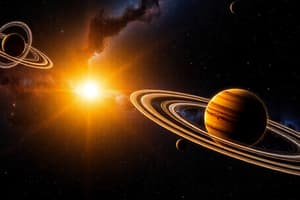Podcast
Questions and Answers
What primary method do humans use to understand the universe?
What primary method do humans use to understand the universe?
- Studying light from celestial bodies (correct)
- Radio communication
- Using advanced software simulations
- Analyzing cosmic dust particles
Which scientist placed the sun at the center of the solar system?
Which scientist placed the sun at the center of the solar system?
- Copernicus (correct)
- Kepler
- Isaac Newton
- Galileo Galilei
Which type of light reveals the characteristics of distant celestial objects like their atmospheric composition?
Which type of light reveals the characteristics of distant celestial objects like their atmospheric composition?
- Infrared light
- Visible light
- Ultraviolet light
- Sunlight (correct)
How has the development of telescopes impacted our understanding of the universe?
How has the development of telescopes impacted our understanding of the universe?
What significant finding has been suggested regarding Mars?
What significant finding has been suggested regarding Mars?
What role do spacecraft play in our exploration of the universe?
What role do spacecraft play in our exploration of the universe?
What do astronomers believe about some moons in our solar system?
What do astronomers believe about some moons in our solar system?
What have telescopes allowed scientists to discover about distant light sources?
What have telescopes allowed scientists to discover about distant light sources?
What does the ongoing exploration of the universe suggest about humanity's place within it?
What does the ongoing exploration of the universe suggest about humanity's place within it?
Flashcards
Cosmology
Cosmology
The study of the universe, including planets, stars, galaxies, and their properties.
Astronomy
Astronomy
The study of celestial objects, their motions, and the universe as a whole.
Solar System
Solar System
The sun and all the celestial bodies that orbit it, such as planets, moons, asteroids, and comets.
Galaxy
Galaxy
Signup and view all the flashcards
Cosmic Light
Cosmic Light
Signup and view all the flashcards
Telescope
Telescope
Signup and view all the flashcards
Black Hole
Black Hole
Signup and view all the flashcards
Spacecraft
Spacecraft
Signup and view all the flashcards
Heliocentric Model
Heliocentric Model
Signup and view all the flashcards
Study Notes
Beyond Our Earth
- Earth is a small part of a vast solar system, galaxy, and universe
- Humans have studied the night sky for a long time
- Light from planets and stars reveals their surfaces, temperature, and composition
- Telescopes helped reveal more about the solar system and universe
- The sun is the center of our solar system
- Distant galaxies are moving away from us
- Spacecraft provide additional information about planets and moons
- Some planets may have different characteristics than initially suspected, eg. Mars having flowing rivers, and moons having oceans hidden beneath the surface.
Learning About the Universe
- Studying patterns in starlight, such as colors, help astronomers determine the composition and temperature of the stars
- Light from stars and planets reveals how they move and change over time
- Various types of light beyond visible light play a vital role, like radio waves, x-rays, and gamma rays, used to detect black holes
- Spacecraft are critical for direct observations and collecting data from planets and moons
- There are still many unknown factors and surprising discoveries about the universe
Studying That Suits You
Use AI to generate personalized quizzes and flashcards to suit your learning preferences.




